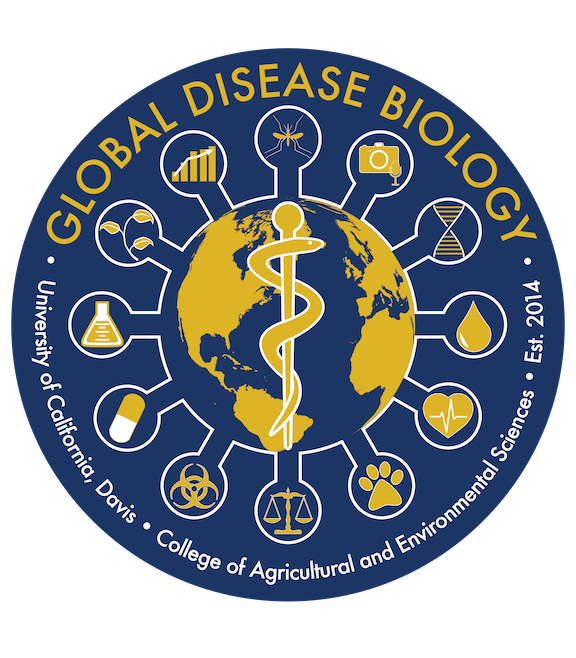Core Courses & Degree Requirements: An Overview
The Global Disease Biology major provides students with broad preparatory scientific course work, GDB core courses, flexibility in upper division electives, and a strong research experience. The GDB major requires courses in chemistry, organic chemistry, biological sciences, physics, mathematics, statistics, evolution, microbiology, and more. A comprehensive list of the major requirements can be found HERE.
The GDB core courses (GDB 90, SAS 13, PMI 129Y, VME 158, GDB 101, GDB 102, and GDB 187) are intended to be multidisciplinary and focus on concepts that cut across human, animal, and plant diseases offering a unifying ecological and quantitative perspective on disease. Students will also be required to take a minimum of two pathogen- and/or disease-specific courses, although they can certainly take more as restricted electives (Guide to GDB Restricted Electives). Pathogen/Disease classes provide depth on specific pathogen groups (e.g., bacteria, viruses, fungi, parasites) or diseases of specific hosts (e.g., humans, plants, animals).
Students prepare for their GDB junior and senior year through a required preparatory seminar course (GDB 187) and are encouraged to customize their GDB experience by putting together, in consultation with their faculty advisor, an interest-driven set of restricted electives. Students may draw from many undergraduate and potentially graduate-level courses relating to disease and health in a way that compliments the core courses required for the major.
GDB Core Course Descriptions
GDB 90: Introduction to Global Disease Biology (1 unit)
Seminar - 1 hours. Introduction to the Global Disease Biology major, research and internship opportunities, and potential career paths in human, animal, and plant health. Communication, ethics and the nature of science.
SAS 13: Disease and Society (3 units)
Lecture - 3 hours. Limited enrollment. Introduction to the concept of disease, the societal and personal impacts of past, present and future diseases, and the science behind disease discoveries, causes, evolution, diagnosis, treatment, and prevention.
PMI 129Y: One Health: Human, Animal & Environment Interfaces (3 units)
Lecture - 1 hours, Discussion (online) - 2 hours. Introduction to fundamentals, challenges, and opportunities in One Health using local and global health case studies. Animal, human, plant, and environmental health problems, along with tools and transdisciplinary approaches, will be introduced to foster innovative thinking that addresses complex issues. This is a hybrid course with both classroom meetings and online discussions.
VME 158: Infectious Disease in Ecology and Conservation (3 units)
Lecture - 3 hours. Introduction to the dynamics and control of infectious disease in wildlife, including zoonotic diseases and those threatening endangered species. Basic epidemiological models and application to field data. Scientists' role in developing disease control policies.
GDB 101: Epidemiology (4 units)
Lecture - 3 hours, Lab - 3 hours. Principles and practice of epidemiology as applied to human, animal, and plant populations and the environment in which these populations co-exist. Quantitative analysis of both infectious and non-infectious disease. Interdependence between epidemiological analysis, decision-making and policy formulation will be highlighted.
GDB 102: Disease Intervention and Policy (4 units)
Lecture - 3 hours, Discussion - 1 hour. Examination of the prevention and treatment of diseases affecting humans, animals, and plants. Case studies will illustrate the merits of a unified approach to promoting health at local, regional, and global scales.
GDB 187: Global Disease Biology Seminar (3 units)
Seminar - 1 hour; discussion - 1 hour; special project. Prerequisite: GDB 90, SAS 13. Open to junior standing; Global Disease Biology majors. Seminar leading to development of the research proposal and academic plan for the Global Disease Biology major.
